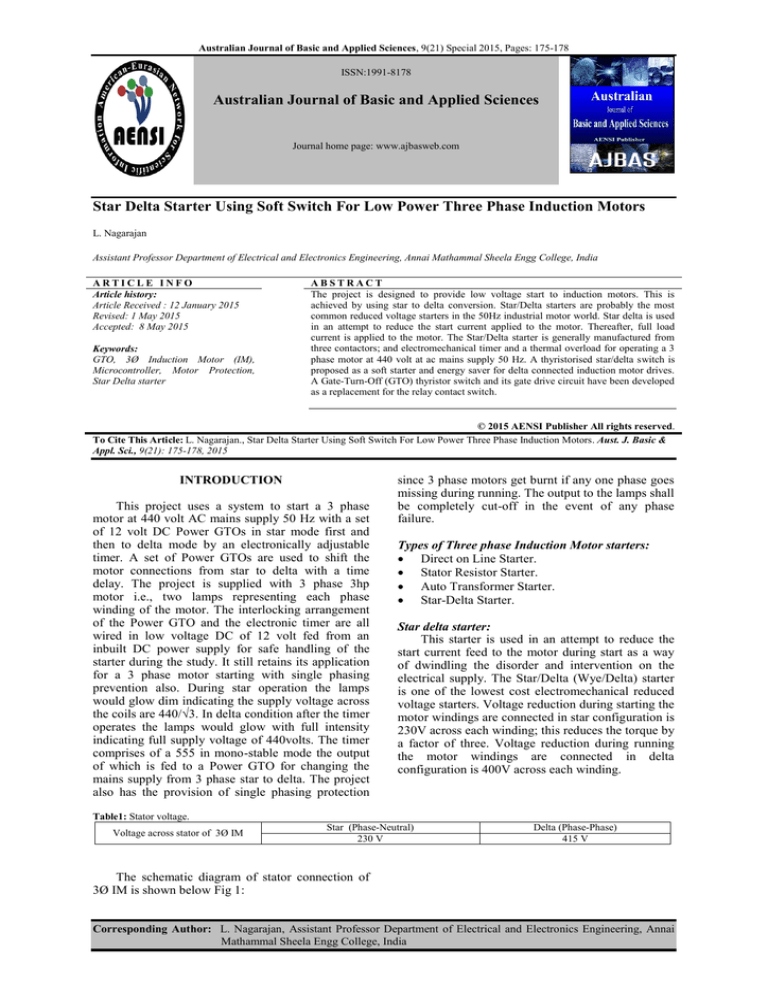
Australian Journal of Basic and Applied Sciences, 9(21) Special 2015, Pages: 175-178
ISSN:1991-8178
Australian Journal of Basic and Applied Sciences
Journal home page: www.ajbasweb.com
Star Delta Starter Using Soft Switch For Low Power Three Phase Induction Motors
L. Nagarajan
Assistant Professor Department of Electrical and Electronics Engineering, Annai Mathammal Sheela Engg College, India
ARTICLE INFO
Article history:
Article Received : 12 January 2015
Revised: 1 May 2015
Accepted: 8 May 2015
Keywords:
GTO, 3Ø Induction Motor (IM),
Microcontroller, Motor Protection,
Star Delta starter
ABSTRACT
The project is designed to provide low voltage start to induction motors. This is
achieved by using star to delta conversion. Star/Delta starters are probably the most
common reduced voltage starters in the 50Hz industrial motor world. Star delta is used
in an attempt to reduce the start current applied to the motor. Thereafter, full load
current is applied to the motor. The Star/Delta starter is generally manufactured from
three contactors; and electromechanical timer and a thermal overload for operating a 3
phase motor at 440 volt at ac mains supply 50 Hz. A thyristorised star/delta switch is
proposed as a soft starter and energy saver for delta connected induction motor drives.
A Gate-Turn-Off (GTO) thyristor switch and its gate drive circuit have been developed
as a replacement for the relay contact switch.
© 2015 AENSI Publisher All rights reserved.
To Cite This Article: L. Nagarajan., Star Delta Starter Using Soft Switch For Low Power Three Phase Induction Motors. Aust. J. Basic &
Appl. Sci., 9(21): 175-178, 2015
INTRODUCTION
This project uses a system to start a 3 phase
motor at 440 volt AC mains supply 50 Hz with a set
of 12 volt DC Power GTOs in star mode first and
then to delta mode by an electronically adjustable
timer. A set of Power GTOs are used to shift the
motor connections from star to delta with a time
delay. The project is supplied with 3 phase 3hp
motor i.e., two lamps representing each phase
winding of the motor. The interlocking arrangement
of the Power GTO and the electronic timer are all
wired in low voltage DC of 12 volt fed from an
inbuilt DC power supply for safe handling of the
starter during the study. It still retains its application
for a 3 phase motor starting with single phasing
prevention also. During star operation the lamps
would glow dim indicating the supply voltage across
the coils are 440/√3. In delta condition after the timer
operates the lamps would glow with full intensity
indicating full supply voltage of 440volts. The timer
comprises of a 555 in mono-stable mode the output
of which is fed to a Power GTO for changing the
mains supply from 3 phase star to delta. The project
also has the provision of single phasing protection
since 3 phase motors get burnt if any one phase goes
missing during running. The output to the lamps shall
be completely cut-off in the event of any phase
failure.
Types of Three phase Induction Motor starters:
Direct on Line Starter.
Stator Resistor Starter.
Auto Transformer Starter.
Star-Delta Starter.
Star delta starter:
This starter is used in an attempt to reduce the
start current feed to the motor during start as a way
of dwindling the disorder and intervention on the
electrical supply. The Star/Delta (Wye/Delta) starter
is one of the lowest cost electromechanical reduced
voltage starters. Voltage reduction during starting the
motor windings are connected in star configuration is
230V across each winding; this reduces the torque by
a factor of three. Voltage reduction during running
the motor windings are connected in delta
configuration is 400V across each winding.
Table1: Stator voltage.
Voltage across stator of 3Ø IM
Star (Phase-Neutral)
230 V
Delta (Phase-Phase)
415 V
The schematic diagram of stator connection of
3Ø IM is shown below Fig 1:
Corresponding Author: L. Nagarajan, Assistant Professor Department of Electrical and Electronics Engineering, Annai
Mathammal Sheela Engg College, India
176
L. Nagarajan, 2015
Australian Journal of Basic and Applied Sciences, 9(21) Special 2015, Pages: 175-178
1.1 Existing Electromechanical Star-Delta Starter
Consists Following Units:
1) Contactors (Main, star and delta contactors).
2) Time relay (pull-in delayed).
3) Three-pole thermal over current release.
Proposed Method:
The proposed star delta starter utilizes GTO
instead
of
electromechanical
relays
(K.
Sundareswaran and B.M. Jos, 2005).
Gate Turn Off Thyristor (Gto):
3.1 What is GTO? How does GTO work?
The Gate turn off thyristor (GTO) is a four layer
PNPN power semiconductor switching device that
can be turned on by a short pulse of gate current and
can be turned off by a reverse gate pulse. Symbol of
GTO is shown in fig-3 below.
Fig. 1: Star and Delta Connection.
Fig. 3: GTO symbol.
Fig. 2: Electromechanical Star-Delta Starter.
2.2 Principle of operation electromechanical Stardelta Starter:
The main contactor connects the reference
source voltage R, Y, B to the primary terminal of the
motor U1, V1, W1.In operation, the Main Contactor
(KM3) and the Star Contactor (KM1) are closed
initially, and then after a period of time, the star
contactor is opened, and then the delta contactor
(KM2) is closed. The control of the contactors is by
the timer (K1T) built into the starter.
2.3 Disadvantages of electromechanical Star-delta
Starter:
Very heavy transients and stresses are produced
while changing from star to delta connections and
because of these transients and stresses many
electrical and mechanical break-down occurs.
The load torque is low at the beginning of the
start and increases with the square of the speed.
When motor reaches approximately 80-85 % of the
rated speed the load torque is equal to the motor
torque and the acceleration ceases. To reach the rated
speed, a switch over to delta position is necessary,
and this will very often result in high transmission
and current peaks.
The transition from star to delta transition
usually occurs once nominal speed is reached, but is
sometimes performed as low as 50% of nominal
speed which make transient sparks.
Since electromechanical relays are used control
over speed cannot be implemented anywhere in the
starter.
As shown the Symbol has three terminals
namely Anode (A), Cathode (K) and Gate (G).
The two-way arrow convention on the gate lead
distinguishes the GTO from the conventional
thyristor.
3.2 Preference for GTO:
There is no need for an external commutation
circuit to turn it off.
The device is turned on by a positive gate
current and it is turned off by a negative gate cathode
voltage.
This reverse gate current amplitude is dependent
on the anode current to be turned off.
The circuits built by this device are compact and
low-cost.
3.3 What are the advantages of GTO?
The prime design goal of GTO devices are to
achieve fast turn off time and high current turn off
capability and to enhance the safe operating area
during turn off. The GTO’s turn off occurs by
removal of excess holes in the cathode base region
by reversing the current through the gate terminal.
High blocking voltage capabilities
High over current capabilities
Exhibits low gate currents
Fast and efficient turn off
Better static and dynamic dv/dt capabilities
3.4 What are the disadvantages of GTO?
On state voltage drop and the associated loss is
more.
Gate drive circuit losses are more.
Its reverse voltage blocking capability is less
than the forward voltage blocking capability.
177
L. Nagarajan, 2015
Australian Journal of Basic and Applied Sciences, 9(21) Special 2015, Pages: 175-178
Magnitude of latching, holding currents is more
than SCR due to multicathode structure.
Reductions Of Using Star Delta Starter:
One major disadvantage of the star delta starting
is the reduction in the starting torque from 1038 Nm
to 343 Nm (by approximately 67%) (Henk de
Swardt, 2007).
The reason for these 67% changes becomes clear
when we examine the phase voltage on the motor, we
see that the phase voltage when the motor is
connected in Delta is 380 Volt. When the motor is
however connected in Star, the Phase Voltage will be
219.3 Volt. The relations for star and delta
connections are as listed in Table 2:
Table 2: Stator voltage and current during Star and Delta.
Star
VLine=√3V Phase
ILine=I Phase
Voltage
Current
Thus, when the motor is started in the star
connection, the phase voltage of the motor is reduced
by a factor of √3.
The reductions in starting current, starting power
and starting torques for a reduced Voltage can each
be calculated by using equation 1 (This ignores other
factors like saturation, etc.):
Reduction in Value [%]
=
x 100……
Delta
VLine=V Phase
ILine=√3I Phase
Schematic star delta starter using GTOs:
(1)
If we apply this equation for the star delta
starting, we see from equation 2 where the 67%
reduction comes from:
Reduction in Value [%]
=
x100……………..
(2)
Fig. 4: Proposed STAR-DELTA starter using GTOs.
=
x100………………
(3)
Hardware implementation of the star delta starter
using GTOs:
=
x100 = 66.66%
Principle Of Operation Of Proposed System Using
Gtos:
In this project six GTOs are used G1, G2, G3,
G4, G5 and G6. During STAR GTOs G1, G2, G3 are
connected to the terminal U1, V1, W1 and G4, G5,
G6 are connected U2, V2, and W2 to neutral. During
DELTA GTOs G1, G2, G3 are connected to the
terminal U1, V1, W1 and G4, G5, G6 are connected
U2, V2, and W2 to U1, V1, W1. During Delta all the
six GTOs are utilized. When the main is switched on
after a time delay of 2 seconds the microcontroller
provides gate signal of +5V to turn ON the GTOs
G1, G2 and G3 the motor starts running in STAR
connection later after a time interval of 20s the
microcontroller switch OFF the STAR GTOs by
providing -12V, then microcontroller switch ON the
DELTA GTOs by providing +5V to the gate of GTO
G4, G5 and G6. Therefore the motor is move
operated in delta connection. The schematic diagram
of proposed starter is shown in the fig 4.
Fig. 5: Hardware implementation of STAR-DELTA
starter using GTOs.
Conclusion and Future Scope:
An automatic voltage fluctuation protector
system has been implemented for protection of
induction motor.
The assembly unit is very compact and portable.
The cost of constructing this project is relatively
low as compared to its function.
It can therefore be easily commercialized.
In feature the GTO can be replaced with SCR
for high power ratings.
178
L. Nagarajan, 2015
Australian Journal of Basic and Applied Sciences, 9(21) Special 2015, Pages: 175-178
Since semiconductor switches are used ZCS and
ZVS in possible.
Along with this by changing the gate triggering
power converter can also be incorporated.
The parameters can be monitored and controlled
will be easy while using the semiconductor switches.
REFERENCES
O. Despe and J. Wang, Argonne National
Laboratory, Argonne, Illinois, U.S.A Design Of A
Gate-Turn-Off (GTO) Switch For Pulsed Power
Application.
K. Sundareswaran and B.M. Jos, 2005.
Development And Analysis Of Novel SoftStarter/Energy-Saver Topology For Delta-Connected
Induction Motors, IEE Proc.-Electr. Power Appl.,
152(4).
Kato, Masakazu, Orikawa, Koji, Itoh, Jun-ichi,
Saitoh, Noboru, 2013. Fast Starting Method Using
Both Inverter And Delta-Star Starter For Weaving
Machine Drive Systems, IEEE 1st International
Future Energy Electronics Conference (IFEEC) Tainan, Taiwan.
Fernando, J.T.E., Ferreira, Baoming Ge, Enrique
C. Quispe, Aníbal T. De AlmeidaFerreira, Fernando
J.T.E. Ge, Baoming, Quispe, 2014. Enrique, C. De Star- And Delta-Connected Windings Tolerance To
Voltage Unbalance In Induction Motors, IEEE XXI
International Conference on Electrical Machines
(ICEM) - Berlin, Germ.
Henk de Swardt, Star Delta starting and dual
Voltage motors explained, 2007. Marthinusen &
Coutts (Pty.) Ltd. A division of Savcio Holdings
(Pty.) Ltd.Rev.
Agbo, D.O., D.T. Kureve, D.H. Shittu, 2014.
Implementation Of An Automatic Induction Motor
Starter With Delay Using Microcontroller,
International Journal Of Scientific & Technology
Research, 3(5): 2277-8616.


